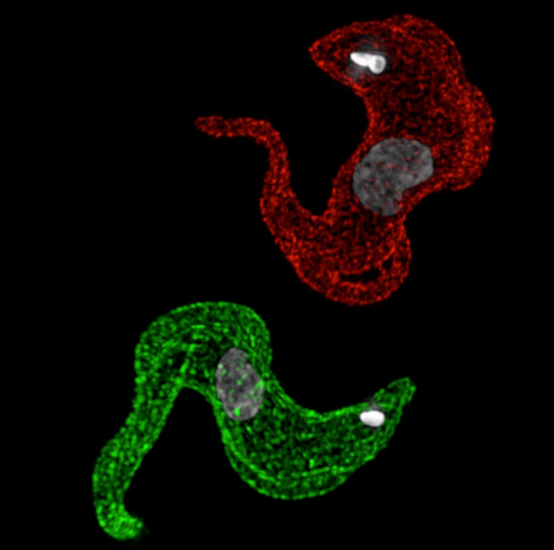Parasites' winner-takes-all mechanism to evade immune defences
Published On Fri 27 May 2016 by Roddy Isles

A genetic game of `winner takes all’ that sustains the parasitic infections which cause sleeping sickness in humans and nagana in cattle – devastating diseases particularly in rural areas of Africa - has been identified in a research breakthrough led by the University of Dundee.
African trypanosomiasis, or sleeping sickness, affects both humans and animals and has a destructive impact, particularly in rural areas. The disease in humans is typically lethal without therapy and in cattle is the most economically important livestock disease in Africa.
The disease parasite is usually transmitted through the bite of an infected tsetse fly. At present, there is no vaccine. This is in part because the parasite cells – trypanosomal pathogens – are masters at evading the immune system.
“There’s a constant ‘arms race’ between our immune system and pathogens, which involves constant change and adaptation on both sides,” said David Horn, Professor of Parasite Molecular Biology in the School of Life Sciences at Dundee.
“Our immune system is generally very good at identifying and eliminating pathogens. But some parasites are stealthy and regularly switch what the immune system ‘sees’. The parasites that cause trypanosomiasis and malaria are classic examples.”
The African trypanosomes constantly undergo variation by changing their surface `protein coat’ to escape immune system defences.
They do this by sequentially expressing a family of variant genes encoding the different protein coats. The genes involved are among the largest families in parasite genomes, numbering into the thousands.
Professor Horn’s team discovered a protein, which they call VEX1, that coordinates this expression of one type of protein coat at a time. VEX1 actually allows genes to compete with each other and helps just one to win the competition- a genetic version of ‘winner takes all’.
“The various mechanisms allowing single gene choice in parasites and in our own cells have remained enigmatic,” said Professor Horn.
“Having identified the trypanosome protein, we can now dissect the mechanism operating in these deadly parasites. We suspect that the mechanism will also share parallels with similarly enigmatic systems operating in other cells.”
The work was funded by grant support from the Wellcome Trust and is published in the journal Proceedings of the National Academy of Sciences USA.
The research paper can be viewed here:
VEX1 controls the allelic exclusion required for antigenic variation in trypanosomes. Glover L, Hutchinson S, Alsford S and Horn D. Proc. Natl. Acad. Sci. USA.
http://www.pnas.org/content/early/2016/05/24/1600344113.abstract
Notes to Editors
Life Sciences at the University of Dundee is the top ranked University in the UK for biological sciences, according to the 2014 Research Excellence Framework.
Dundee is internationally recognised for the quality of its teaching and research and has a core mission to transform lives across society. More than 17,000 students are enrolled at Dundee, helping make the city Scotland’s most student-friendly.
The University is the central hub for a multi-million pound biotechnology sector in the east of Scotland, which now accounts for 16% of the local economy. www.dundee.ac.uk
The Wellcome Trust is a global charitable foundation dedicated to improving health. We support bright minds in science, the humanities and the social sciences, as well as education, public engagement and the application of research to medicine.
Our investment portfolio gives us the independence to support such transformative work as the sequencing and understanding of the human genome, research that established front-line drugs for malaria, and Wellcome Collection, our free venue for the incurably curious that explores medicine, life and art. www.wellcome.ac.uk
Image shows the different surface `coats’ (red and green cells) that parasitic trypanosomes can switch between to escape host adaptive immunity.
For media enquiries contact:
Roddy Isles
Head of Corporate Communications
University of Dundee
Nethergate, Dundee, DD1 4HN
Tel: +44 (0)1382 384910
Mobile: 07800 581902
Email: r.isles@dundee.ac.uk